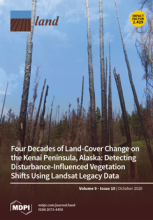Land Library
Welcome to the Land Portal Library. Explore our vast collection of open-access resources (over 74,000) including reports, journal articles, research papers, peer-reviewed publications, legal documents, videos and much more.
/ library resources
Showing items 1 through 9 of 40.Growing external pressures from human activities and climate change can exacerbate desertification, compromising the livelihoods of more than 25% of the world’s population.
Land degradation has become one of the major global environmental problems threatening human well-being. Whether degraded land can be restored has a profound effect on the achievement of the 2030 UN Sustainable Development Goals.
This study investigates the main threats related to environmental degradation that affect Amazonian Indigenous Lands (ILs). Through a cluster analysis, we group ILs according to the set of common environmental threats that occur within and outside their limits.
In the context of current agrarian reform efforts in South Africa, this paper analyses the livelihood trajectories of ‘emergent’ farmers in Eastern Cape Province.
Land degradation, especially soil erosion, is a societal issue that affects vineyards worldwide, but there are no current investigations that inform specifically about soil erosion rates in Chinese vineyards.
Modern urbanism is called to face current challenges ranging from intensive demographic growth, economic and social stagnation to resources salvation and climate changes.
Understanding Soil Degradation Processes (SDPs) is a fundamental issue for humankind. Soil degradation involves complex processes that are influenced by a multifaceted ensemble of socioeconomic and ecological factors at vastly different spatial scales.
The aim of the paper was to present the procedure of building neighborhood resilience to climate threats, embedded in planning (from the strategic to local level) and design process and focused on usage of natural adaptive potential.
Achieving change to address soil erosion has been a global yet elusive goal for decades. Efforts to implement effective solutions have often fallen short due to a lack of sustained, context-appropriate and multi-disciplinary engagement with the problem.


